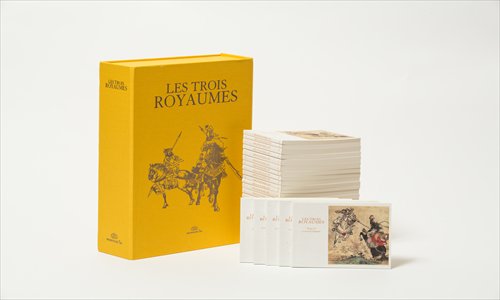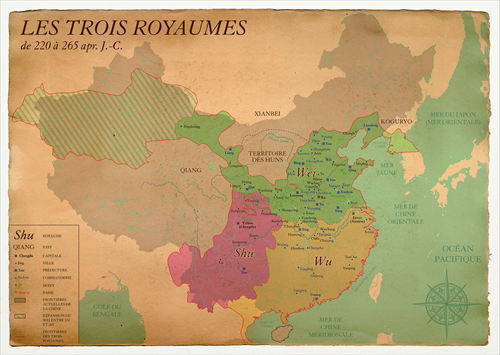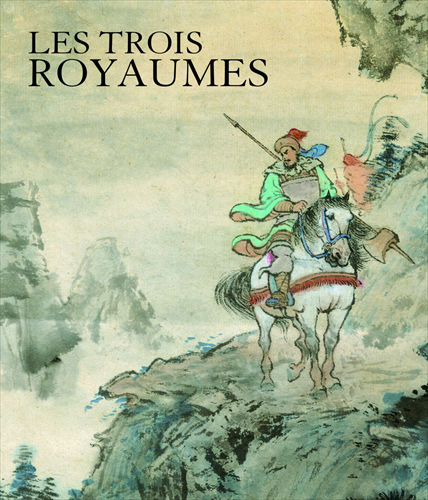Translating the classics
"Why do they both feel like gay love stories?" Nicolas Henry joked to his publisher, Xu Gefei, after he finished translating into his native French the Chinese comic book (lianhuanhua) versions of Water Margin and Romance of the Three Kingdoms, two of the "Four Great Classical Novels of Chinese literature."
"Of course, I knew he was just kidding," Xu told the Global Times. "What he meant was that these two works feature many male characters who appreciate each other greatly and there is a sort of fraternity between them."
"Joking aside, as a foreigner, he obviously read the romantic heroism complex contained in both these works," Xu added.
Within the past two years, Xu's comic publishing house based in Paris, Les Editions Fei, released the French lianhuanhua versions of Water Margin and Romance of the Three Kingdoms in France and other French-speaking territories around the world, including Belgium, Luxembourg, Switzerland and Canada.
Both of them were co-translated and adapted by Henry and Henry's Chinese wife, Si Mo. The couple was chosen by Xu after she read Henry's adaptation of a martial arts novel by Jin Yong.

A set of the French lianhuanhua versions of Romance of the Three Kingdoms
Henry majored in Chinese Language and Literature at the National Institute of Oriental Languages and Civilizations in Paris and Si studied Chinese Language and Literature at Nanjing University and also Western Art History at the University of Lyon.
Xu told the Global Times that from the outset she did not want an academic sinologist to work on the translation and adaptation, but preferred to find someone who was both interested in Chinese literature and also familiar with French popular tastes.
According to Xu and Si, although Water Margin was first translated into French in the 1970s and the earliest French translation of Romance of the Three Kingdoms dates back to the 19th century, these two stories aren't well-known among the French public because the translations are overly scholarly and not easy to understand for most readers.
However, Xu and Si both believed that with their vivid pictures, comic books could make the classic works of Chinese literature accessible to a wider foreign audience.
"France is the second largest comic book market in the world after Japan, with a wide range of readers," Xu added.
In order to appeal to the tastes and modes of thinking of French readers, Henry and Si tried to find similar subjects explored in classic French literature which they could use as a general guide.

A map and an illustration from Romance of the Three Kingdoms
"In fact, 'romantic heroism' is a universal value which is found in many French literary classics, the most obvious ones being The Three Musketeers and Robin Hood," Si said. In the end, they translated and adapted Water Margin based on the literary style of the celebrated French writer Alexandre Dumas, and for Romance of the Three Kingdoms, they took their cue from French poet and troubadour Chrétien de Troyes, who is known for his series of works on King Arthur, Britain's legendary medieval monarch.
Another challenge was translating certain Chinese words and concepts. "We particularly took great pains in translating ancient Chinese official positions, which feature heavily in both Water Margin and Romance of the Three Kingdoms," Si said.
She explained that many official titles didn't have a clearly defined role or place in a hierarchy. "It was usually given by the lord or the master as long as he was pleased," Si said, "and we could only try our best to find the most similar equivalents in ancient France."
"Since our purpose was to create an enjoyable reading experience, I didn't want those official positions to confuse people and interrupt the pleasure of reading," she added.

A map and an illustration from Romance of the Three Kingdoms Photos: Courtesy of Xu Gefei
However, Si told us that she was also pleasantly surprised to find that some Chinese idioms have perfect equivalents in French. "Like the Chinese idiom, 'geqiang youer,' in French, its counterpart is 'Les murs ont des oreilles,'" a warning meaning 'the walls have ears.'
Xu obtained the copyright permission to translate the lianhuanhua versions of Water Margin from People's Fine Arts Publishing House in Beijing and Romance of the Three Kingdoms from Shanghai People's Fine Arts Publishing House.
"Both of them were originally created by first-class comic book experts in China in the 1950s, and the line-drawn pictures in traditional ink and brush style still look lively and interesting today," Xu said.
Xu told the Global Times that the French lianhuanhua versions of Journey to the West and Dream of the Red Chamber, the other two novels in the "Four Great Classics" of Chinese literature, will be forthcoming in the next two years, also translated by Si and Henry.
"Dream of the Red Chamber is probably the most difficult to translate among the four since it is about the history of the rise and fall of a big Chinese feudal family and every character could have their own separate novel. We are thinking about whether we can do it by following the style of Marcel Proust," Si said.